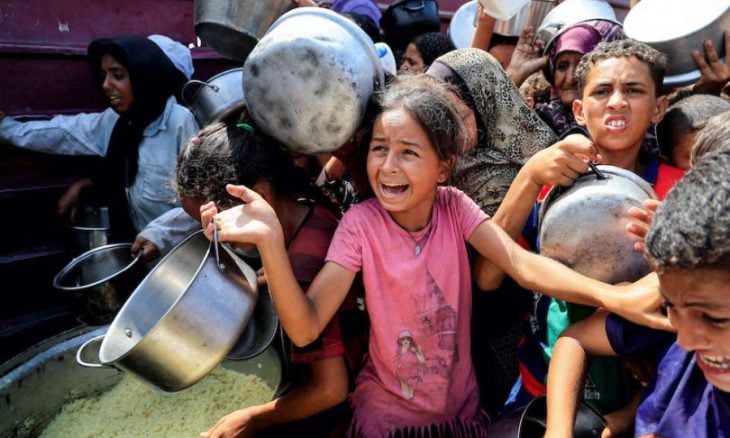Palestine, Sudan, and the Global North's Indifference
The famines in Gaza and Sudan: how they compare and what lessons can be drawn from the world powers' inaction towards them.
8/26/2025


Palestine, Sudan, and the Global North's Indifference
Gilbert Achcar
The Financial Times published last Monday an article based on Integrated Food Security Phase Classification (IPC) reports, warning of the increasing incidence of famine in the world and focusing on the two most serious current crises: the famines in Gaza and Sudan. The IPC was developed by the Food Security Analysis Unit (FSAU) of the United Nations’ Food and Agriculture Organization (FAO). It was elaborated some 20 years ago, in response to worsening famine in Somalia. The IPC uses a standardized scale that takes into account food security data, nutrition scores, and available livelihoods in each crisis, allowing for an assessment of its severity and for comparison between crises so as to identify the most serious.
The direst level in the FSAU’s classification is Phase 5 of Catastrophe / Famine. Under the latter condition, “at least one in five (or 20 percent) of households have an extreme lack of food and face starvation resulting in death, destitution and extremely critical levels of acute malnutrition”. The description of Famine goes on as follows: “In this Phase, prevalence of acute malnutrition in children under five exceeds 30 percent, and households have reached a point of destitution, and death.” Before Catastrophe / Famine there is the Emergency phase, in which families suffer from “large food consumption gaps which are reflected in very high acute malnutrition and excess mortality”, or they are forced to resort to extreme measures to avoid starvation, such as liquidating their few remaining belongings.
Given that Sudan’s population (approximately 50 million) is twenty-five times that of Gaza (approximately 2.2 million), the first striking feature of the IPC data is the number of people facing Catastrophe / Famine in each case. The number in the Gaza Strip (641,000) is greater than the number in Sudan (637,000). As for the number of people facing Emergency in Sudan (8,100,000), it is only slightly more than seven times their number in Gaza (1,140,000). Overall, the “phase classification” data indicates that the entire population of the Gaza Strip and nearly half of Sudan’s population are suffering from food insecurity, requiring urgent action to prevent their condition from worsening.
Given that the world’s attention is focused on Gaza far more than on what is happening in Sudan, and since everyone knows that the famine in the Strip is not a natural phenomenon nor is it the result of a lack of humanitarian aid, but that such aid is available at Gaza’s gates in sufficient quantities to prevent the spread of hunger there if those gates were opened, the first conclusion that flows from the above figures is that the famine in Gaza is the result of a deliberate attempt to suffocate its population. It is part of the genocidal war that the Israeli state is waging against them, aiming to kill a large number and force the emigration of most of the rest.
The second lesson from the aforementioned data is that the world’s acute awareness of what is happening in the Gaza Strip greatly increases the responsibility of those countries that are capable of exerting effective pressure on the Zionist state. In addition to the primary role played by the United States in this regard, these countries include the European Union and most Western states, but also Russia and China. Either they are complicit in the genocide or are insufficiently concerned to take serious action to stop it (or they are busy waging their own war of aggression, as Russia is in Ukraine). The fact is that all the countries in question have multifaceted economic, military, and political ties with Israel, which have so far outweighed the need to stop the genocide.
The third lesson is the world’s disgusting indifference to what is happening in Sudan. This is the most serious humanitarian crisis in our contemporary world, with the terrifying figures of food insecurity being compounded by the displacement of approximately fifteen million people within or outside Sudan’s borders. While the horror of Israel’s genocidal war in Gaza is visible on the world’s screens every day, even every hour, the horror of what is happening in Sudan – whether the criminal war in which the two Sudanese military factions are fighting at the expense of the population, or the genocide which the Rapid Support Forces have resumed perpetrating in Darfur – is almost completely ignored by Western media outlets, except for the occasional isolated report.
This disparity in attention reminds us, once again, of what Mahmoud Darwish told the Israeli poet Helit Yeshurun during an interview she conducted with him in 1996: “Do you know why we Palestinians are famous? It’s because you are our enemy. Interest in the Palestinian question flows from interest in the Jewish question. Yes. People are interested in you, not me! … The international [in fact, Western] interest in the Palestinian question merely reflects the interest people take in the Jewish question.” (see “Rafah and El Fasher: Genocidal War and Duty of Solidarity”, Al-Quds al-Arabi, 14 May 2024).
The reason for this latter interest happens to be the same Western leaders invoke to justify their inaction regarding the Zionist state’s genocide in Gaza (it is sufficient to compare this inaction with the intensive efforts they deploy to confront Russia’s war on Ukraine). In sum, the people of the poor countries of the Global South are nothing more than second- or third-class humans in the global apartheid system that prevails throughout the world.
Translated from the Arabic original published in Al-Quds al-Arabi on 26 August 2025. Feel free to republish or to publish in other languages, with mention of the source.